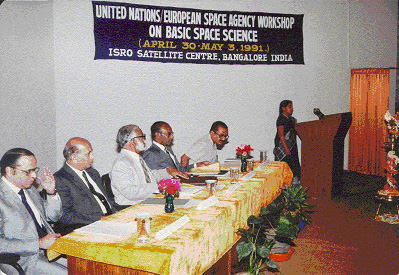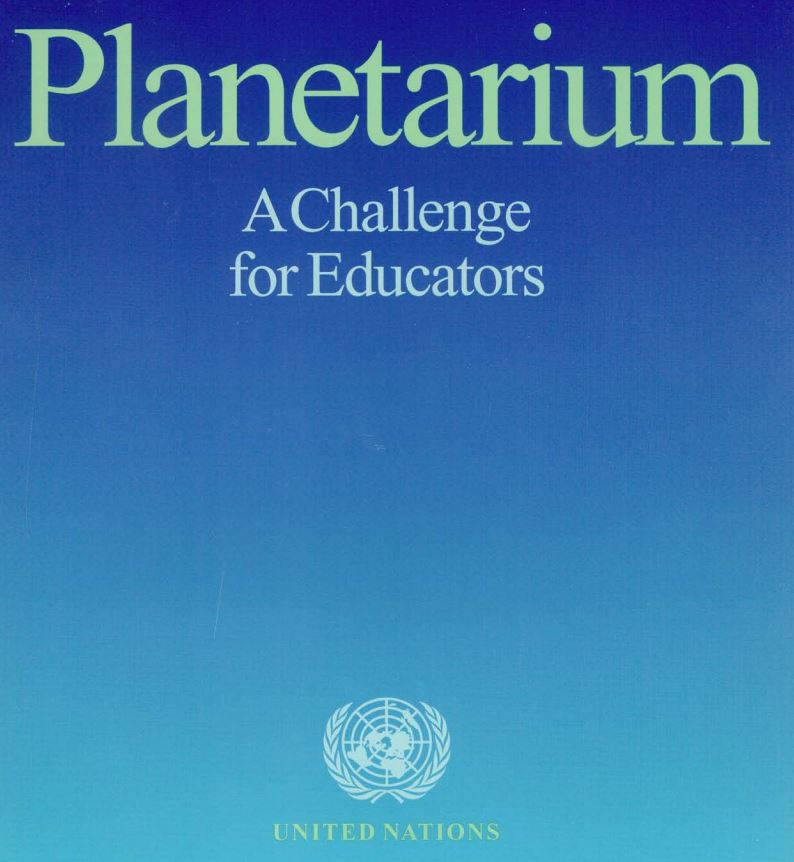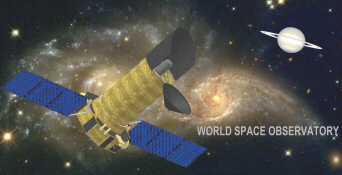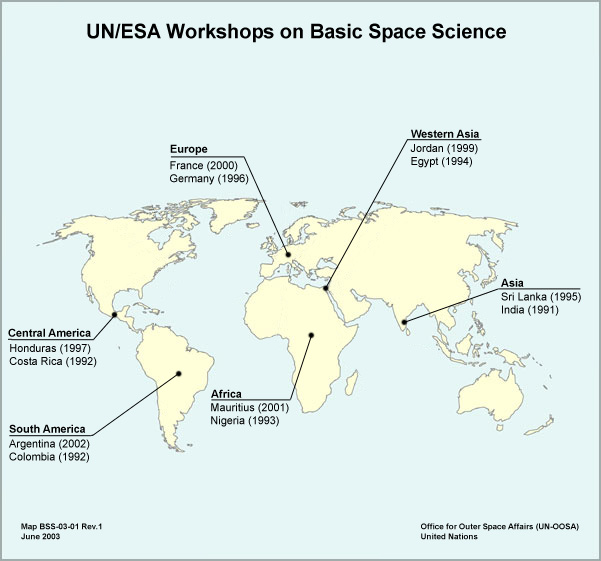Basic Space Science Workshops (1991-2004)
Introduction

The United Nations Programme on Space Applications, since its inauguration in 1971, has made an effort in furthering knowledge and experience of space applications around the world. Provision of in-country capacity-building, education, research and development support and technical advisory services by the Programme have all helped to create conditions under which the developing countries have started to benefit also from some of the progress made in the basic space science by the - at that time - still very small number of developed countries actively involved in space. However, until 1990, this provision focused mainly on applications oriented activities in remote sensing of the Earth, meteorological satellite applications, and satellite communications. Only in the late 1980s, discussions among developing countries, the United Nations and the European Space Agency (ESA) identified the possible need and importance to support the growth of small research groups in universities and research establishments in the developing countries in the field of astronomy and space science. This lead to the holding of the UN/ESA Workshops on basic space science on an annual basis in the different regions: Asia and the Pacific, Latin America and the Caribbean, Africa, Western Asia, and Europe.
Scope
To assure that the UN/ESA workshops do not create a duplication of efforts with other activities in the UN framework, an important issue was the definition of the nature of basic space science and its involved technologies. These were defined in the first workshop and have been maintained throughout the series (A/AC.105/489). In the context of the needs for the developing countries, basic space science was defined to cover:
- Fundamental physics,
- Astronomy and Astrophysics,
- Solar-terrestrial interaction and its influence on terrestrial climate,
- Planetary and atmospheric studies, and
- Origin of life and exo-biology.
With the applicable techniques as tools for the pursuance of basic space science research:
- Ground-based optical, and radio observations,
- Radio and optical telescopes with associated equipment,
- Remote sensing, both from the ground and from space,
- All measurements from ground-inaccessible windows which can only be made through the use of instruments and telescopes in Earth orbit,
- In-situ measurements from rocket, balloon and satellite platforms.
Workshops
The first United Nations/European Space Agency Workshop on Basic Space Science was held in Bangalore, India in 1991. Between 1991 and 2004 twelve workshops were held in various regions of the World. The support of Member States (Governments) and their participation in these workshops, under the auspices of the UN Programme for Space Applications, was crucial for the success of these workshops.
Holding the workshops in different regions allows a factual focus to be developed, addressing the fundamental questions and their relevance in a regional context. Associated with each workshop were very dynamic working group sessions in which the participating scientists were able to raise the issues perceived to be of relevance and interest in their own environment. Each of the UN/ESA Workshops has resulted in a set of unique observations and recommendations identifying the regional needs, strengths and possible outlook for future progress. These observations and recommendations are contained in the UN General Assembly documents for wider distribution among Member States as shown in the table below.
List of workshops and associated recommendations and observations documents
| Workshop | Recommendations and Observations document | Proceedings |
| 1st UN/ESA Workshop on Basic space Science: 1991 Bangalore, India | A/AC.105/489 | Khanna,AIP, 1992, Conf. Proc. Vol. 245 |
| 2nd UN/ESA Workshop on Basic space Science: 1992 San Juan, Costa Rica & Bogota, Columbia | A/AC.105/530 | Torres, 1994, APSS, Vol. 214, No.1-2 |
| 3rd UN/ESA Workshop on Basic space Science: 1993 Ile-Ife, Nigeria | A/AC.105/560/Add.1 | Onuora, 1994, AIP, Conf.Proc. Vol. 320 |
| 4th UN/ESA Workshop on Basic space Science: 1994, Cairo, Egypt | A/AC.105/580 | Mikhail, 1995, APSS, Vol. 228, No.1-2 |
| 5th UN/ESA Workshop on Basic space Science: from Small Telescopes to Space Missions, hosted by the Arthur C. Clarke Centre for Modern Technologies on behalf of the Government of Sri Lanka (Colombo 11-14 January 1996) | A/AC.105/640 | ---- |
| 6th UN/ESA Workshop on Basic Space Science: Ground-Based and Space-Borne Astronomy, hosted by the German Space Agency, on behalf of the Government Of Germany, at the Max-Planck-Institute for Radioastronomy (Bonn, Germany, 9-13 September 1996) | A/AC.105/657 | Mezger, 1998,APSS, Vol. 258, No.1-2 |
| 7th UN/ESA Workshop on Basic Space Science: Small Astronomical Telescopes and Satellites in Education and Research, hosted by the Observatorio Astronómico de la Universidad Nacional Autónoma de Honduras, on behalf of the Government of Honduras (Tegucigalpa, 16-20 June 1997) | A/AC.105/682 | ----- |
| 8th UN/ESA Workshop on Basic Space Science: Scientific Exploration from Space, hosted by the Institute of Astronomy and Space Sciences at Al Al-Bayt University on behalf of the Government of the Hashemite Kingdom of Jordan (Mafraq, Jordan, 13-17 March 1999) | A/AC.105/723 | Al-Naimiy, 2000, APSS, Vol.273, No.1-2 |
| 9th UN/ESA Workshop on Basic Space Science: Satellites and Networks of Telescopes-Tools for Global Participation in the Study of the Universe (Toulouse, France, 27-30 June 2000) | A/AC.105/742 | ----- |
| 10th UN/ESA Workshop on Basic Space Science: Exploring the Universe; Sky Surveys, Space Exploration and Space Technologies (Reduit, Mauritius, 25-29 June 2001) | A/AC.105/766 | Rughooputh, 2002, APSS,282, Vol.1 |
| 11th UN/ESA Workshop on Basic Space Science: the World Space Observatory and the Virtual Observatories in the Era of 10-metre Telescope (Cordoba, Argentina, 9-13 September 2002) | A/AC.105/784 | Rabolli, 2003 |
| 12th UN/ESA Workshop on Basic Space Science (Beijing, 24-28 May 2004) | A/AC.105/829 |
Note: Reports are also available through the Documents and Resolutions Database. If a document is unavailable online, please contact us including your name, address and the symbol or title of the required document.
Accomplishments
Establishment of Telescope and Planetarium Facilities
From the results of the deliberations, an implementation model for the accelerated implementation of basic space science associated activities in developing countries has been developed and is referred to in general as "Tripod". The Tripod concept, identified in the very first workshop in India, is to assure in the developing countries:
- The availability of research tools of a level where meaningful science can be made, but at a level where the national socio-economical infrastructure can maintain functionality in the university/research laboratory environment, e.g. a small telescope facility.
- Teaching materials allowing basic space science to be introduced at the teaching level of fundamental mathematics, physics and chemistry courses in middle and higher education.
- Application materials for original research in basic space science such as e.g. observing programmes for variable stars.
Using this approach, small astronomical telescope facilities in Colombia, Egypt, Honduras, Jordan, Morocco, Paraguay, Peru, the Philippines, Sri Lanka, and Uruguay have been established and continue to be in operation. The introduction of astronomy in the context of basic space science in university curricula in countries such as Honduras as a regional activity is a result of the Tripodial approach. Archives of data from basic space science space missions is another result and has already introduced a new parameter in the Tripod and will, in the future, contribute a fourth leg to the implementation process.

Planetariums can make an important contribution to the study and appreciation of the Universe around us. To help generate interest and support for planetariums as centres for culture and education, the UN, as part of ISY activities, published the guidebook "Planetarium: A Challenge for Educators".
read the guidebook

World Space Observatory
If agreement on the implementation of the next phase of active observational capabilities can be reached, as proposed in the World Space Observatory concept, the basic space science environment in the developing countries will have made the necessary quantum jump needed for accelerated development
Virtual Observatories
If the communications environment in developing countries can be advanced, as has been recommended in all workshops, the availability of the Virtual Observatory concept will be another important contribution to the process.
Other resources available online
- International Astronomical Union (IAU)
- International Virtual Observatory Alliance
- NASA Astrophysics Data System (ADS)
- arXiv.org e-Print archive (Cornell University)
- Poster of the 2003 COSPAR/IAU Workshop held in conjunction with UN/ESA Workshop
- Poster of the 2004 COSPAR/IAU Workshop held in conjunction with UN/ESA Workshop
